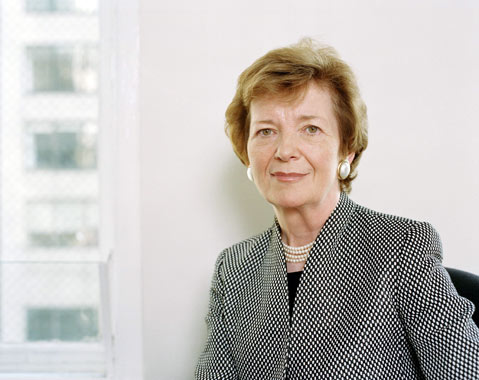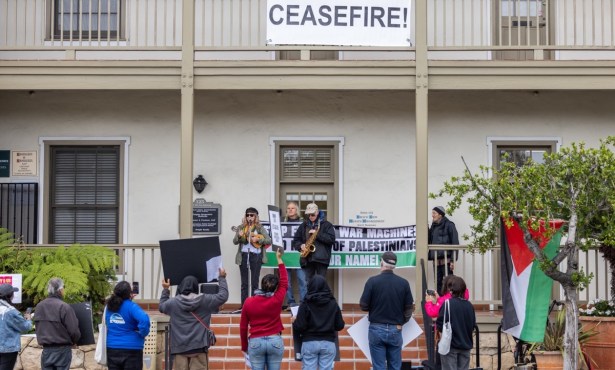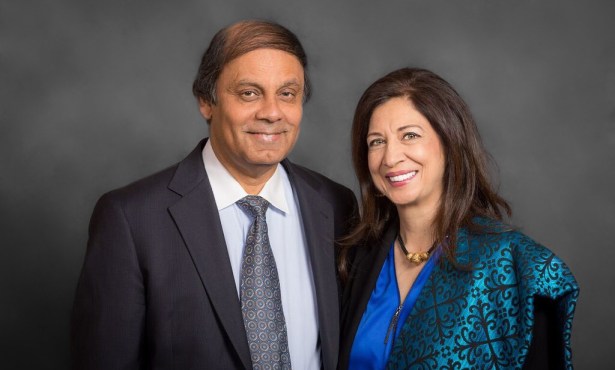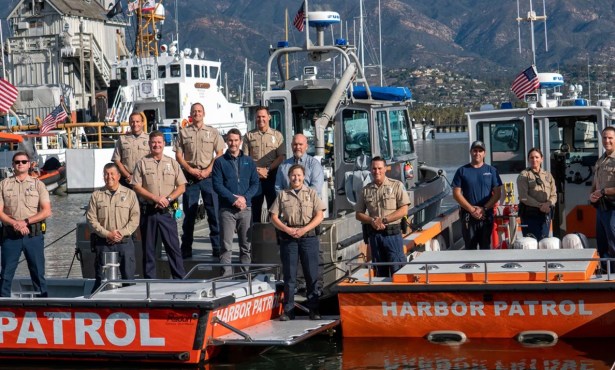Mary Robinson
Former Irish President Leads the Charge for Global Human Rights

In 1990, Mary Robinson was elected President of Ireland, the first woman to hold that office. A particularly popular and transformative figure, Robinson left the presidency a few weeks shy of term in 1997 to become the United Nations High Commissioner for Human Rights, a post that she held until 2002. Since then, Robinson has been a leader in the global human and women’s rights field. Her current project, the Mary Robinson Foundation for Climate Justice, sees her working to gain human rights for those most affected by the growing extreme weather changes. I recently spoke over the phone with the articulate, delightful Robinson from her hotel room in New York City about her foundation, corporate responsibility in the area of human rights, and women’s role in global affairs.
What will your visit to Santa Barbara entail? In the case of coming to Santa Barbara, I’m not just talking at the Arts & Lectures event; I’m also giving a master class on business and human rights. That’s an area I have a lot of interest in. In fact, while I was here in New York, I chaired the Institute for Human Rights and Business, which was formed in 2009 as a way of bringing forward a very fast-moving agenda of how corporations have to respect human rights.
Are corporations coming around to that idea? There were guidelines on a framework that was forwarded three years ago to the Human Rights Council by [Harvard] professor John Ruggie. [The framework] is called Protect, Respect, and Remedy. The “Protect” is that states should protect people from violations of their human rights, including by corporations. “Respect” is that all corporations should respect human rights, and if they have a long supply chain, they should do the due diligence to make sure that right down that supply chain, human rights are being respected by those that supply goods to them, say. “Remedy” is that we need a better and wider range of remedy, including mediation and other forms of remedy to allow people to get redress for compensation if their rights are violated.
It sounds like a daunting project. It’s something that has happened really very quickly over a short period. The Human Rights Council in Geneva rarely adopts any measure unanimously. But it not only passed the guidelines that Professor Ruggie put forward this June, but also endorsed them. … It will take many years for full implementation, but now we have a common platform, a common standard.
How long have you been interested in the business side of human rights? It has been one strand of human rights that I’ve been interested in from my time as High Commissioner …. [Several] strands, really, led to the establishment of the Institute for Human Rights and Business, which operates out of London (ihrb.org). I’m also involved in a new area of human rights with my foundation, the Mary Robinson Foundation for Climate Justice, working to develop human rights and climate change.
Can you explain that further? We have to put emphasis on decent work with a safety-net approach, and corporate responsibility and women’s leadership. And I found that in the African companies we were working in, the additional factor that kept coming up was the weather — prolonged drought, prolonged flooding, sea surges, they were undermining subsistence farmers. And I realized that the poorest are the most affected now by these climate changes and they are the least responsible. And that requires a kind of environmental justice approach …. It’s a whole field of new creative endeavor.
That sounds very exciting. I think it is, and actually, I’ve also been interested all my life in women’s leadership. And women are leading on climate. We had a meeting here in New York of women leaders to ensure that gender would figure in the climate movement …. When you have people living in poverty, it’s women who pick up the pieces in their community, but it’s also women who can be agents of change if they get the opportunity.
There was quite a bit fuss here in the U.S. when Hillary Clinton ran for president. I think she broke through the glass ceiling …. She showed that she would be perfectly capable of it …. I was asked by a journalist during that period, “Is the United States ready for a woman president?” I didn’t answer the question directly. What I said was, well look at the situation of Ireland. I was elected in 1990, and I served for seven years. The current president, Mary McAleese, was elected and served for seven years and then she went forward for another seven. So Ireland has 21 years of a woman president. And now, we both tell the same sad story that small boys in Ireland weep on their mother’s knee and say, “Why can’t I grow up to be president?” [laughs]
4•1•1
Mary Robinson will speak Friday, October 21, at 8 p.m. at UCSB’s Campbell Hall. Tickets are $20 (general), $10 (students). For more info, call 893-3535.



